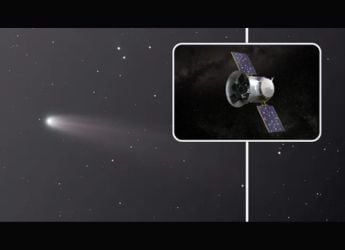- Home
- Science
- Science News
- SpaceX Launches 60 More Starlink Internet Beaming Mini Satellites, Its Third Batch
SpaceX Launches 60 More Starlink Internet-Beaming Mini Satellites, Its Third Batch
The cluster of 60 SpaceX Starlink satellites separated successfully from a Falcon 9 rocket on Tuesday.
SpaceX on Monday launched its third batch of 60 mini-satellites into orbit, part of its plans to build a giant constellation of thousands of spacecraft that will form a global broadband Internet system.
The cluster of 60 satellites separated successfully from a Falcon 9 rocket above the ocean between Australia and Antarctica an hour after its launch from Cape Canaveral, Florida at 9:19pm (0219 GMT Tuesday).
The satellite deployment, which was filmed live by a camera onboard the rocket, brings the total number of satellites that are part of the US company's Starlink network to just under 180.
But that figure could one day total 42,000, resulting in far more crowded skies, which has raised concerns among astronomers that they may one day threaten our view of the cosmos.
To put that into context, there are currently around 2,100 active satellites orbiting our planet, according to the Satellite Industry Association.
The launch was broadcast live by SpaceX, a company created by tycoon Elon Musk, who is also chief executive of Tesla.
SpaceX's goal is to control a huge share of the future Internet market from space. Several rivals have the same ambition, including London-based startup OneWeb and giant US retailer Amazon, whose Project Kuiper is far less advanced.
Musk hopes eventually to control three to five percent of the global Internet market -- a share valued at $30 billion a year, or 10 times what SpaceX is earning from its space launches, and plough the profits back into rocket and spaceship development.
SpaceX's boss also entertains a long-time dream of colonizing Mars.
Astronomy concerns
His California-based company has so far received US authorization to launch 12,000 satellites in several different orbits, and it has applied to launch as many as 30,000 more.
SpaceX says its satellite constellation will be operational for Canada and the northern US by next year.
Astronomers say the proliferation of the bright metallic satellites could seriously degrade the night view, interfering with both optical and radio astronomy.
But SpaceX argues it has taken steps to reduce the satellites' reflectivity and is testing an experimental darkening treatment on one of the satellites.
Laura Forczyk, a space analyst, said the measures' effectiveness was still uncertain.
"SpaceX has not yet eased the minds of astronomers concerned about the reflectivity of their Starlink satellites," she told AFP.
"The real test will be the days following launch when the smallsats are close together and in a lower altitude before ascending to their final orbit. Astronomers and stargazers will be able to compare the brightness of this current batch of smallsats compared to previous versions."
Another criticism of more crowded skies is it will result in expensive collisions between satellites, potentially creating thousands of pieces of new space junk.
SpaceX says it has a plan for that, too: its Starlink satellites deploy at an altitude of 290 kilometers (180 miles) and then engage their ion thrusters to reach an orbit of 550 kilometers (340 miles).
At the end of their life-cycles, the satellites will use their propulsion systems to de-orbit over the course of a few months -- or if these fail, they will burn up naturally in the atmosphere in under five years, compared to the thousands of years required at higher altitudes.
Get your daily dose of tech news, reviews, and insights, in under 80 characters on Gadgets 360 Turbo. Connect with fellow tech lovers on our Forum. Follow us on X, Facebook, WhatsApp, Threads and Google News for instant updates. Catch all the action on our YouTube channel.
Related Stories
- Samsung Galaxy Unpacked 2025
- ChatGPT
- Redmi Note 14 Pro+
- iPhone 16
- Apple Vision Pro
- Oneplus 12
- OnePlus Nord CE 3 Lite 5G
- iPhone 13
- Xiaomi 14 Pro
- Oppo Find N3
- Tecno Spark Go (2023)
- Realme V30
- Best Phones Under 25000
- Samsung Galaxy S24 Series
- Cryptocurrency
- iQoo 12
- Samsung Galaxy S24 Ultra
- Giottus
- Samsung Galaxy Z Flip 5
- Apple 'Scary Fast'
- Housefull 5
- GoPro Hero 12 Black Review
- Invincible Season 2
- JioGlass
- HD Ready TV
- Laptop Under 50000
- Smartwatch Under 10000
- Latest Mobile Phones
- Compare Phones
- Redmi Turbo 5
- Redmi Turbo 5 Max
- Moto G77
- Moto G67
- Realme P4 Power 5G
- Vivo X200T
- Realme Neo 8
- OPPO Reno 15 FS
- HP HyperX Omen 15
- Acer Chromebook 311 (2026)
- Lenovo Idea Tab Plus
- Realme Pad 3
- HMD Watch P1
- HMD Watch X1
- Haier H5E Series
- Acerpure Nitro Z Series 100-inch QLED TV
- Asus ROG Ally
- Nintendo Switch Lite
- Haier 1.6 Ton 5 Star Inverter Split AC (HSU19G-MZAID5BN-INV)
- Haier 1.6 Ton 5 Star Inverter Split AC (HSU19G-MZAIM5BN-INV)

















